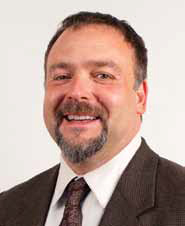Quick Bio
NAME: Bob Boster
COMPANY: Clear-Com
TITLE: President
OVERTME: After joining Clear-Com in 2006, Boster advanced through the ranks to become vice president of worldwide sales, where he was responsible for all the company’s worldwide sales activities. Before joining Clear-Com, Boster held the position of vice president of sales for the Western U.S. region and Canada at ENCO Systems.
SCN: When did you first develop the interests that led you to pursue a bachelor’s degree in radio, television, and motion pictures?
Bob Boster: Actually it’s somewhat interesting that my initial academic interest in these was in media criticism. I was always quite engaged by the ways in which media influences people and a couple early classes in film criticism pointed the way. Once I had signed up for a major in the field, I started taking some technical courses in production, which overlapped nicely with my background in technical theatre (which I had been doing since before I was a teenager). My work in audio came more from doing sound for theatre, and then live sound for bands, which then influenced my interest in radio. I was the station manager of WXY C-FM in Chapel Hill, NC during this period for a couple years also, so there was a generous amount of cross-contamination across these areas.

Boster strives to balance customer input with innovation in Clear-Com product development.SCN: Your master’s degree is in electronic music and recording technology. How do the creative components of electronic music feed into your technical understanding?
BB: My main creative interest as a sound artist was building ad-hoc systems of audio devices (I tended to refer to them as ‘instruments’) to achieve different possible outcomes in a performance setting. The source material fed into the system would vary, and then the instrument would be manipulated in an improvisational way to result in a ‘musical’ performance. This is not so different from designing an intercom solution for a customer’s specific needs, which then gets used differently as an event or production unfolds, but is unique to each application. So you can see the mindset involved in each process is pretty similar even if the technologies and applications are different.
SCN: Early in your career you worked in software development at Orban. What do you feel is most often overlooked in user interface development?
BB: Actually I would go to the extreme and say the most overlooked part of UI development is UI development. So many companies scrimp on this area of investment. There are hundreds of reasons, but it all comes down to money; if the driver of our business is going to always be cost to the end user, then companies are going to assume they can figure out the UI ‘on the fly’ because the size of the market is too small to afford to luxury of a UI specialist in the overall development budgets.
SCN: Next, you ascended the managerial ranks at ENCO Systems, a digital audio delivery platform provider. What ideas about product development did you gain from your experience in product management and sales at ENCO?
BB: While working at ENCO I learned something that has stuck with me now: there is an important dynamic tension in product development between hearing customer needs on one hand and developing something they haven’t even imagined yet on the other. Products that are based on a laundry list of customer input end up seeming unfocused or lack novelty. Pure innovation for its own sake almost never solves customer problems and thus is at best a fanciful distraction. Developing products with a balance of those two factors is our goal and has served us well overall.
SCN: How has your experience in radio and broadcast helped you climb the ranks at Clear- Com following your joining the company in 2006?
BB: The variety of roles I’ve had in the manufacturing side of the business has woven together well with my previous experience as an intercom user to provide me a great foundation for my position at Clear-Com. Having worked in product development, product management, general management, territorial sales, and sales management, all in an environment which involved interacting with customers and partners at a variety of levels of business, all prepared me well for serving as president of Clear-Com.
SCN: From the perspective of a company with interests across several markets, what can the AV integration market learn from Clear-Com’s other application segments?
BB: I think the key to this success is that it has been an organic outgrowth of our presales service engagement with the marketplace—both end users and partners. Since well before I came to the company, we developed a reputation as being willing to help people come up with solutions for their ‘somewhat out of the box’ communications requirements. By our nature as a company, we are always interested in helping out, and the more novel the application, the better. Fastforward a dozen years or more and now you find a company with an actual track record of delivering solutions to more than 20 specific niche applications outside of our core business.
Kirsten Nelson is the editor of SCN.
